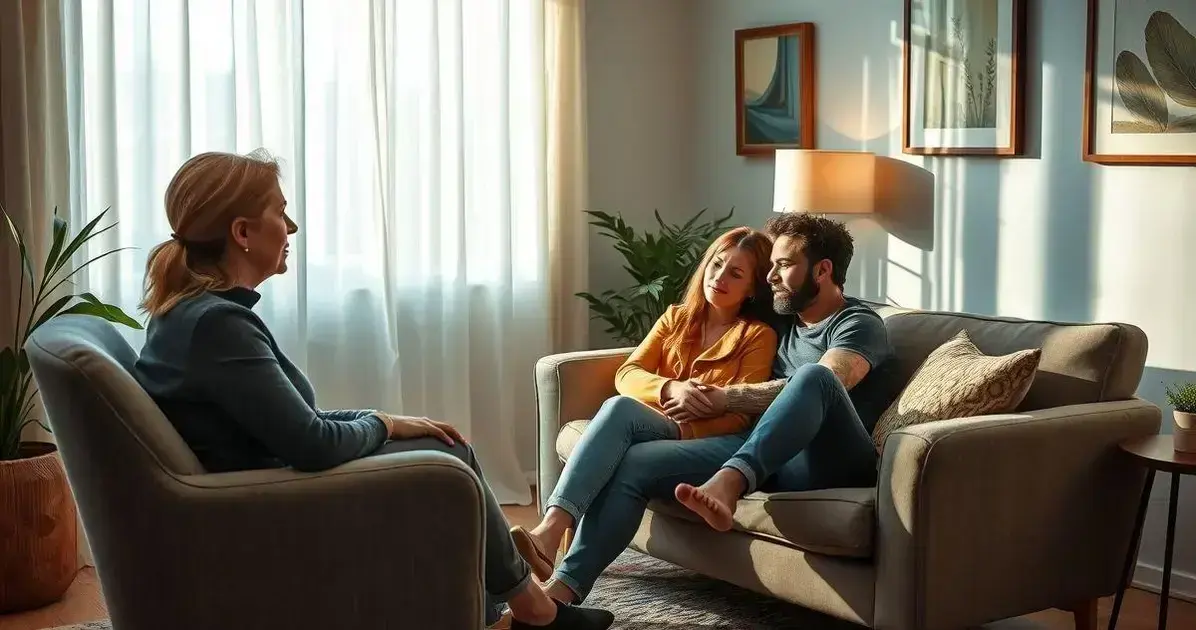Announcements
Relationship therapy is a specialized form of counseling that helps couples improve communication, resolve conflicts, and deepen their emotional connection.
With the guidance of a trained therapist, couples can address their challenges, learn effective strategies, and strengthen their bond.
Relationship therapy offers couples a chance to improve their bonds and communication.
Announcements
Whether you’re facing challenges or simply want to deepen your connection, this therapeutic approach is invaluable.
Understanding Relationship Therapy
Understanding relationship therapy is crucial for couples seeking to improve their connection.
Announcements
This specialized therapy is designed for partners facing challenges or wanting to enhance their relationship.
It involves a trained therapist who facilitates discussions, helping both partners express their feelings and views openly.
At its core, relationship therapy focuses on communication. Many couples struggle with misunderstandings and unspoken emotions.
A therapist can guide conversations, making it easier to address sensitive topics. They use effective techniques to help couples communicate better, listen actively, and express empathy.
What to Expect in Therapy Sessions
In therapy sessions, couples can expect to discuss their challenges in a safe and supportive environment. The therapist will encourage openness and honesty, enabling partners to share their thoughts without fear of judgment. This can often lead to breakthroughs in understanding and compassion.
Types of Relationship Therapy
There are various approaches to relationship therapy. Some focus on cognitive-behavioral strategies to change negative patterns.
Others might incorporate emotion-focused techniques that prioritize emotional connection and attachment.
Understanding these different methods can help couples choose the right approach for them.
Who Can Benefit from Relationship Therapy?
Nearly any couple can benefit from relationship therapy.
Whether you’re experiencing significant issues or simply want to strengthen your bond, therapy can provide valuable insights.
Even happy couples can find ways to enhance their relationship through this process, ensuring it remains strong over time.
Overall, understanding relationship therapy is the first step for those looking to foster a healthier, more satisfying partnership.
The guidance of a skilled therapist can make a profound difference in navigating the complexities of love and togetherness.
Benefits of Relationship Therapy
Benefits of relationship therapy are numerous and can significantly enhance the quality of a couple’s connection. One of the primary advantages is improved communication.
Therapy provides a safe space for partners to express their feelings and clarify misunderstandings.
By learning to communicate effectively, couples can reduce conflicts and build a stronger foundation.
Additionally, relationship therapy helps in resolving conflicts. Couples often face disagreements that can be difficult to navigate alone.
A therapist can offer tools and strategies to resolve these issues, allowing couples to deal with their differences in a constructive way.
Emotional Support
Another key benefit is the emotional support offered during the therapy process.
Couples face many challenges together, and having a neutral third party can help them feel understood and supported.
This can lead to greater emotional intimacy and bonding.
Breaking Negative Patterns
Many couples fall into negative cycles that can harm their relationship. Therapy provides insights into these destructive patterns.
By identifying and addressing them, couples can break these cycles, leading to healthier interactions. This process often results in renewed love and appreciation for one another.
Improved Problem-Solving Skills
Relationship therapy also equips partners with better problem-solving skills. Couples learn how to approach challenges together, considering each other’s perspectives.
This collaboration fosters teamwork and strengthens the overall bond.
Lastly, participating in relationship therapy can help couples grow individually. While the focus is on the relationship, each partner can discover more about themselves.
This self-awareness often leads to personal growth, positively impacting the couple dynamic.
How Relationship Therapy Works

How relationship therapy works involves a structured process that helps couples address their issues and enhance their communication.
Typically, therapy sessions are led by a trained therapist who specializes in relationship dynamics.
Each session typically begins with both partners sharing their thoughts and feelings about their relationship.
The therapist listens carefully, taking note of both verbal and non-verbal cues. This helps in understanding the underlying issues that couples face.
Setting Goals
In therapy, it’s essential to set clear and achievable goals. The therapist will work with the couple to identify specific objectives they wish to accomplish.
This could range from improving communication to resolving specific conflicts. Having these goals keeps the therapy focused and productive.
Techniques Used in Therapy
Therapists use various techniques to facilitate discussions and interventions.
One popular method is active listening, where each partner is encouraged to listen attentively to the other without interrupting.
This practice helps in fostering understanding and empathy.
Another effective technique is role-playing, where partners may be asked to act out scenarios.
This helps them see situations from each other’s perspectives, leading to better understanding and compassion.
Ongoing Process
Relationship therapy is an ongoing process. It may not yield immediate results, and couples should expect to attend several sessions.
The therapist will regularly review progress and make adjustments to the therapy plan as needed. This flexibility is vital for adapting to the unique needs of each couple.
Additionally, therapy sessions may include homework or assignments for couples to practice skills discussed in therapy.
These activities reinforce learning and application in real-life situations.
Finding the Right Therapist
Finding the right therapist is vital for effective relationship therapy. With many options available, it can feel overwhelming.
Here are some steps to help you choose the best fit for you and your partner.
First, consider the therapist’s qualifications. Look for someone who is licensed and experienced in relationship therapy.
This often includes degrees in counseling or psychology, along with specific training in couple’s therapy techniques.
Specialization Matters
Different therapists may specialize in various approaches. Some might focus on communication techniques, while others may use cognitive-behavioral methods.
Research several therapists to find someone whose approach resonates with you both. Don’t be afraid to ask about their methods and what to expect during sessions.
Check Reviews and Recommendations
Word of mouth can be incredibly valuable. Talk to friends or family members who have undergone therapy. They might recommend someone who helped them.
Online reviews can also give insights into a therapist’s effectiveness and style.
Initial Consultation
Most therapists offer an initial consultation. This meeting allows you and your partner to assess how comfortable you feel with the therapist.
Pay attention to whether they listen well and if you feel understood. Your comfort level is crucial for productive sessions.
Affordability and Accessibility
Consider the costs involved. Therapy can require a significant financial commitment, so check if the therapist accepts insurance or offers sliding scale fees.
Additionally, think about location and availability. Choosing someone close by, with hours that fit your schedule, can reduce barriers to attending sessions.
Finally, trust your instincts. After meeting with a therapist, if it doesn’t feel like the right match, it’s okay to seek someone else.
The right therapist will make both partners feel safe, respected, and supported throughout the process.
Common Myths About Relationship Therapy
There are many common myths about relationship therapy that can prevent couples from seeking help.
Understanding these myths is crucial for those considering therapy as a way to enhance their relationship.
One common myth is that therapy is only for couples in crisis. Many people think that only partners with severe issues need therapy.
In reality, relationship therapy can benefit all couples, regardless of their situation. Even if a relationship is strong, therapy can provide tools to deepen connections and improve communication.
Myth of Blame
Another myth is that one partner will be blamed for the problems in the relationship.
Many imagine that a therapist will take sides. However, therapists aim to create a safe environment for both partners.
They focus on understanding behaviors and communication patterns, not assigning blame.
Instant Fix
Some believe that relationship therapy provides quick fixes to issues. Couples may expect immediate solutions after just one or two sessions.
In truth, therapy is a process that requires time and commitment from both partners.
Progress happens gradually as couples work together to understand and resolve their challenges.
Therapists Know Best
Another misconception is that therapists have all the answers. While therapists provide guidance and support, they do not dictate how couples should behave.
Each couple is unique, and therapists help them find their path forward, offering tools and insights tailored to their specific needs.
Stigma Around Therapy
Lastly, a stigma surrounds seeking therapy. Some individuals view therapy as a sign of weakness.
On the contrary, seeking help can be a courageous step toward healing and growth.
It shows a commitment to improving the relationship and prioritizing the emotional well-being of both partners.
FAQ – Frequently Asked Questions about Relationship Therapy
Is relationship therapy only for couples in crisis?
No, relationship therapy can benefit all couples. Even if a relationship is strong, it can provide tools to deepen connections and improve communication.
Will one partner be blamed for our issues in therapy?
No, therapists create a safe environment for both partners, focusing on understanding behaviors and communication patterns rather than assigning blame.
Can we expect quick fixes from relationship therapy?
No, therapy is a process that requires time and commitment. Progress often happens gradually as couples work together to understand and resolve their challenges.
Do therapists have all the answers for my relationship?
Not necessarily. While therapists provide guidance and support, they help couples find their own path rather than dictating how they should behave.
Is there a stigma around seeking relationship therapy?
Yes, some people view therapy as a sign of weakness. However, seeking help shows a commitment to improving the relationship and prioritizing emotional well-being.
What should we look for when finding the right therapist?
Look for qualified therapists with experience in relationship therapy, whose approach resonates with you both, and who create a comfortable space for discussion.







